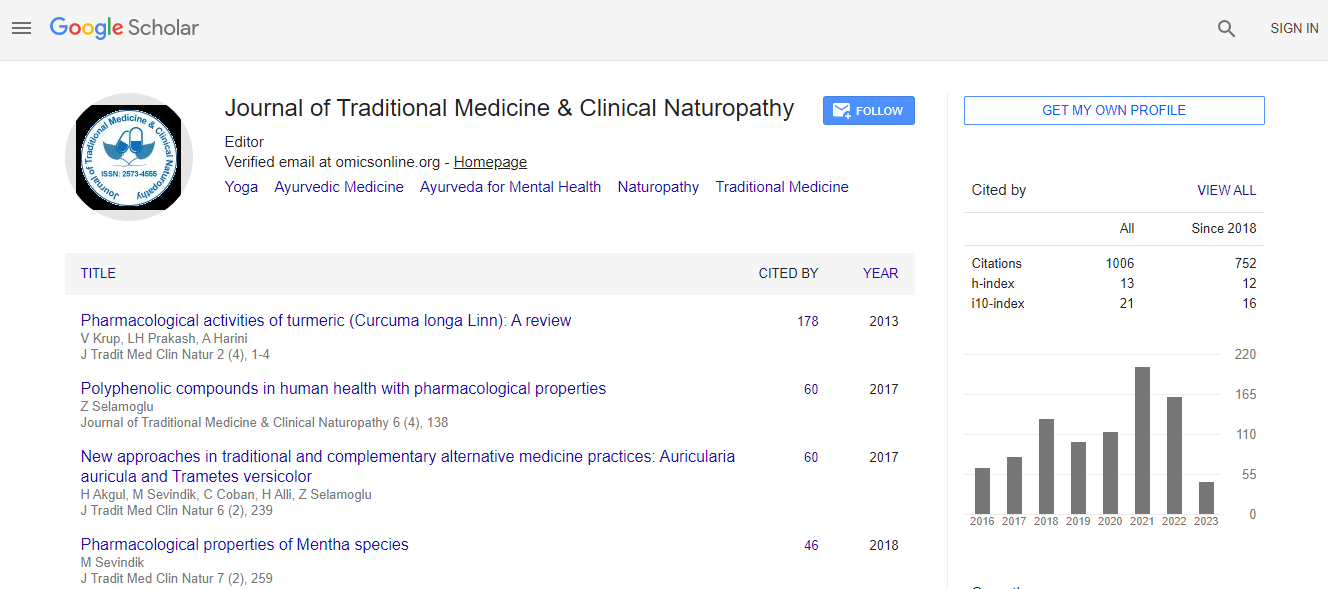Our Group organises 3000+ Global Conferenceseries Events every year across USA, Europe & Asia with support from 1000 more scientific Societies and Publishes 700+ Open Access Journals which contains over 50000 eminent personalities, reputed scientists as editorial board members.
Open Access Journals gaining more Readers and Citations
700 Journals and 15,000,000 Readers Each Journal is getting 25,000+ Readers
Google Scholar citation report
Citations : 1504
Journal of Traditional Medicine & Clinical Naturopathy peer review process verified at publons
Indexed In
- CAS Source Index (CASSI)
- Google Scholar
- Sherpa Romeo
- Open J Gate
- Genamics JournalSeek
- RefSeek
- Directory of Research Journal Indexing (DRJI)
- Hamdard University
- EBSCO A-Z
- Publons
- Geneva Foundation for Medical Education and Research
- Euro Pub
- ICMJE
Useful Links
Recommended Journals
Related Subjects
Share This Page
Neuropsychiatric effects of Nigella sativa (Black seed)
6th International Conference and Exhibition on Traditional & Alternative Medicine
Mohammad A Randhawa and Shehab A Alenazi
Northern Border University, Saudi Arabia
ScientificTracks Abstracts: J Tradi Med Clin Natur
Abstract
Nigella sativa (N. sativa) seed, commonly known as ��?Black Seed��? in English and ��?Al-Habba Al-Sauda��?in Arabic, has been frequently used as a folk medicine for a large number of diseases since ancient times. N. sativa was shown to contain many active components, e.g., thymoquinone, thymohydroquinone, dithymoquinone, thymol, carvacrol, nigellimine-N-oxide, nigellicine, nigellidine and alpha-hederin. In addition, N. sativa seed, its oil, various extracts and active components are known to possess very useful pharmacological effects to include: immune stimulation, antiinflammatory, antioxidant, anticancer, hypoglycemic, antihypertensive, antiasthmatic, antimicrobial, antiparasitic; and effects on neurological and psychiatric disorders. Some authors have reviewed these pharmacological activities in general but their neuropsychiatric effects are not separately and adequately described. The literature search has revealed a lot of publications pertaining to the actions of N. sativa in neurological and psychiatric problems, e.g., the control of pain, Parkinsonism, epilepsy and anxiety, as well as improvement of memory, alertness, elevation of mood and feeling of good health, etc. Moreover, because of its antioxidant and antiinflammatory effects was shown to provide neuroprotection from spinal cord injury and prevent damage to brain cells from various nerve toxins in experimental animal models. The present article is intended to briefly review the valuable efforts of scientists to investigate the pharmacological activities and therapeutic potential of this precious natural herb pertaining to the neuropsychiatric disorders. It is hoped that our manuscript would be of particular interest to the neurologists and psychiatrists, and the information provided would also benefit general physicians, medical students and the community.Biography
Mohammad A Randhawa graduated from King Edward Medical College Lahore in 1973, completed his Master of Philosophy from University of Punjab Lahore and obtained PhD from Quaid-e-Azam University Islamabad. He also got his Post-graduate fellowship from Clinical Pharmacology Unit of St. Bartholomews Hospital London, UK. Currently, he is appointed as Professor and Head of Department of Pharmacology at the College of Medicine, Northern Border University, Arar, Saudi Arabia. He has published more than 40 research articles in reputed scientific journals and has reviewed numerous research projects and manuscripts related to Nigella sativa (Black seed).
Email: mrakramsa@yahoo.co.uk

 Spanish
Spanish  Chinese
Chinese  Russian
Russian  German
German  French
French  Japanese
Japanese  Portuguese
Portuguese  Hindi
Hindi 
